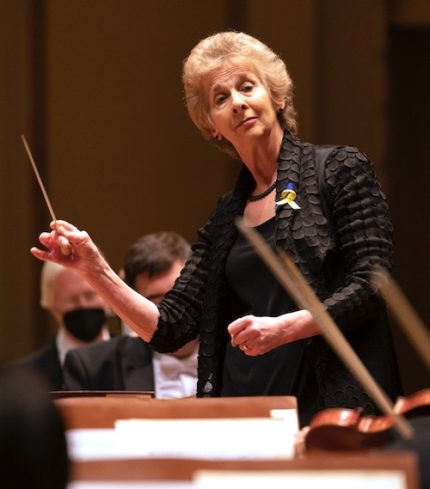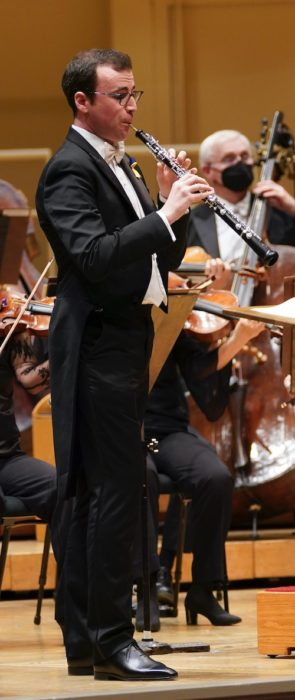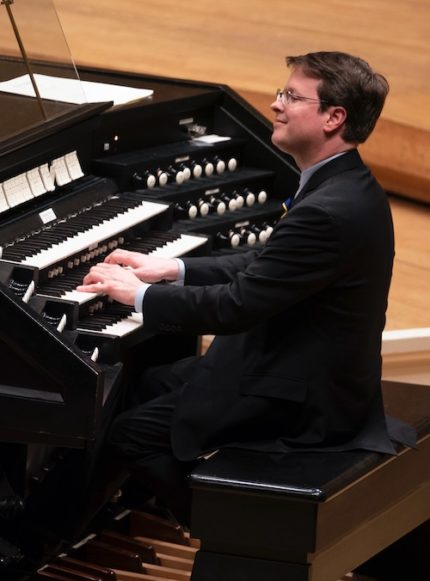A pair of superb soloists highlight Glover’s CSO debut

The news for this week’s Chicago Symphony Orchestra concert is that Dame Jane Glover, music director of Music of the Baroque, is making her belated debut with the big band on Michigan Avenue.
It was heartening to see Glover finally show up on the Orchestra Hall podium Thursday night after two decades as a high-profile presence in Chicago. Still one couldn’t help feeling that, at least programatically, the event amounted to a missed opportunity.
For this week’s chamber orchestra-sized forces, Glover led a program of Handel, Haydn and Mozart—the same repertoire in which local audiences have regularly heard her since 2002. Why not let her conduct the CSO in some neoclassical Stravinsky or a 20th- or 21st-century work? Hearing Glover in something other than the usual Classical-Baroque fare would have afforded a rare chance to encounter her in a broader range of music.
That said, the CSO performances under Glover were dispatched with the usual crisp direction, vigor and finish of her MOB performances. Even so, the most compelling performances of the evening came from the evening’s two soloists.
It’s been a good couple weeks for Mozart concertos at Orchestra Hall with inspired outings by Martin Helmchen last week and William Welter Thursday night.
Since becoming the CSO’s principal oboe in 2018, Welter has quickly become a shining light among the CSO’s esteemed woodwinds and, indeed, of the entire orchestra—popular with audiences and colleagues alike.
Welter made his CSO solo debut in Mozart’s Oboe Concerto, the work’s first appearance on a subscription concert in 15 years. Welter brought his tangy, penetrating timbre, assured technique and easy articulation to Mozart’s engaging score. In the opening movement, his projection felt fitfully over-reticent and one wanted him to play out a bit more. Also the awkward cadenzas written for him by CSO violist colleague Max Raimi didn’t do any favors for the performance or Mozart’s music.

That apart, this was a superb performance. Welter brought poised expression to the Adagio, his light tracery of the melancholy rendered with sensitivity. The playful vitality of the concluding Rondo was especially winning, and Welter’s liquid articulation in the solo runs recalled Mozart’s description of his own violin playing: “It went like oil.” Glover and the oboist’s CSO colleagues were simpatico partners throughout.
It’s hard to believe that there was once a regular solo organ series at Orchestra Hall. There is no repertoire more sorely neglected in Chicago than organ music—solo or concertante—so kudos to Glover for inviting Paul Jacobs to perform Handel’s Organ Concerto No. 4 in F major.
Handel wrote his six organ concertos for performances at his oratorios, in which the composer would sit down at the console and provide some flashy solo display during intermissions. That likely accounts for their brevity with No. 4 one of the longest at just 16 minutes.

Jacobs is among the finest organists on the scene today and it was good to have him back in town, even for such a brief piece. The soloist chose mostly convincing registrations for each of the four movements, apart from the eerie, echoey timbre for the Adagio, which verged a bit on Lon Chaney. Jacobs’ lightly virtuosic touch provided nimble articulation in the opening Allegro (nice perky flute stops), plumbed a mellow lyricism in the Andante, and brought jaunty bravura to the stately finale. Glover deftly handled the tricky balancing, keeping organ and orchestra distinct and in scale.
A thought: why doesn’t some enterprising presenter book Paul Jacobs to perform Bach’s complete organ works in Chicago? He has performed the 18-hour oeuvre elsewhere and, with all the magnificent instruments scattered among churches in Chicago, such a series would spotlight an important yet woefully neglected Baroque cornerstone.
The evening was framed by a pair of symphonies by Haydn and Mozart.
The temptation to debut a Haydn symphony is hard to resist, and Glover opened the program with the Symphony No. 71 in B-flat major in its belated CSO premiere.
Among his 104 works in the genre, there are many first-class Haydn symphonies that continue to lie neglected. No. 71 isn’t one of them. The work is agreeable enough if not with the kind of individuality, indelible themes or distinctive qualities that would lift it out of its current neglect.
Glover directed an efficient and well-balanced reading. The spirited finale came off best with crackling energy, the violins excelling in their whirling part writing. Elsewhere, as with her Haydn outings with MOB, Glover’s direction felt literal and emphatic in music that requires a lighter touch, stinting on Haydn’s wit and charm.
The conductor was more in her element with Mozart’s Symphony No. 29, which closed the program. Written at age 18, No. 29 is one of Mozart’s finest early symphonies and, amazingly, hasn’t been played by the CSO in 18 years.
Glover conducted K. 201 just last year in a streamed MOB program and this week’s CSO performance was in the same graceful tradition. The opening movement would have benefited from more rhythmic bite and urgency and, while elegant and skillfully balanced, the lovely Andante verged on a stately blandness. Here too, the finale came off best, vital and given greater incisiveness.
The program will be repeated 8 p.m. Saturday. cso.org
Posted in Uncategorized


Posted Mar 19, 2022 at 8:49 pm by Heather Walters
Paul Jacobs should be give more opportunities in Chicago and elsewhere to perform all of Bach’s organ works. It’s wonderful music.
“A thought: why doesn’t some enterprising presenter book Paul Jacobs to perform Bach’s complete organ works in Chicago? He has performed the 18-hour oeuvre elsewhere and, with all the magnificent instruments scattered among churches in Chicago, such a series would spotlight an important yet woefully neglected Baroque cornerstone. “
Posted Mar 21, 2022 at 12:28 pm by Herbert Heppner
My wife and I are long term subscribers to the CSO and we attended Dame Jane Glover’s Saturday evening concert. We also marveled at the solo performers. It was perhaps only the second time in our fifty years in attendance that we heard the organ featured. Paul Jacobs was terrific!
The Bach complete organ works would be a joy to hear or perhaps Joseph Jongen’s Symphonie Concertante or Francis Poulenc’s Organ Concerto! We hope the organ takes center stage with future CSO programming or elsewhere in the Chicagoland area. Glad to be writing this note on Bach’s Birthday!
Posted Mar 25, 2022 at 4:24 am by Alexander Platt
I completely agree: why would you have Jane Glover conduct exactly the same kind of repertoire she’s been doing for the last 20 years across the street with MOB? What a missed opportunity, to not have heard her artistry in Britten, Walton, Stravinsky, French music….an endless number of things.